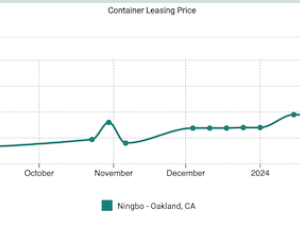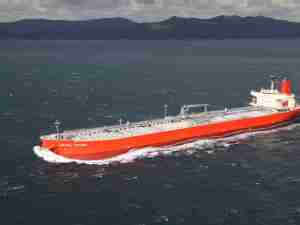Coal Soars on Cyclone’s Hit as UBS Sees Scope for $100 Surge
By: | Apr 04 2017 at 08:03 AM | Maritime
Coking coal rallied by the most in four years after damage from Tropical Cyclone Debbie hit shipments from the top exporter, setting off a surge in producers’ shares as Wood Mackenzie Ltd. and UBS Group AG predicted the commodity’s advance may have much further to run.
Spot hard coking coal, a vital ingredient in steel-making along with iron ore rose 0.6 percent to $176.80 a metric ton Tuesday, after soaring 15 percent a day earlier, according to The Steel Index. Monday’s jump was the biggest daily gain in data going back to May 2013. Thermal coal gained 6.2 percent to $88.05 a ton on Monday.
Australia is the world’s biggest shipper, and the cyclone smashed into the east coast last week, triggering floods and landslides in Queensland, the producer of more than 50 percent of the world’s seaborne coking coal. The Goonyella rail corridor, which carries more than half of the state’s exports, is expected to take five weeks to repair, according to operator Aurizon Holdings Ltd. Prices more than doubled last year, topping $300 a ton, after output curbs in China.
“We expect a significant price impact,” Wood Mackenzie said in a note on Monday. Price increases to “levels seen last year and in 2011 are not beyond the realms of possibility,” with 16.2 million tons, or 7 percent of Queensland’s exports, halted from the outage, the firm said.
UBS also raised the possibility of further gains. The spot price could jump by $100 a ton or more from the outages caused by the cyclone, the bank said in an April 3 note that was issued before Monday’s advance.
Contracts for premium metallurgical coal rallied to a record $330 a ton in 2011 after floods in Queensland left pits full of water. They were settled at $285 for the first three months of this year, boosted by production curbs in China, after gaining to a high of $308 in November.
Short-Term Winners
In Australia, producers with mines in New South Wales were not impacted by the cyclone and may emerge as the short-term winners, according to UBS. South32 Ltd. ended 2.5 percent higher on Tuesday, while Whitehaven Coal Ltd. gained 5.5 percent by the close as the stock rose for a sixth day.
There were gains too in Indonesia, PT Adaro Energy, the country’s biggest producer by market capitalization, gained 6.9 percent by the midday break in Jakarta , while PT Bumi Resources, the biggest producer by volume, rallied more than 20 percent.
The timing of the disruption in Australia may strengthen the hand of producers as they negotiate second-quarter contracts with Japan’s steelmakers, according to Credit Suisse Group AG. The second-quarter price may reach $180 a ton, Bloomberg Intelligence analyst Andrew Cosgrove said.
“Japanese negotiators may be feeling chagrin at the second-quarter contract negotiations,” Credit Suisse analyst Matthew Hope said in a note. Offers are “likely to be at a substantially higher price,” putting pressure on buyers reeling after prices surged last year amid China’s effort to curb capacity and trim supply, he said.
BHP Billiton Ltd., the world’s biggest exporter of metallurgical coal, is resuming operations in Queensland’s Bowen Basin, and the company said on Monday it will continue to monitor the impact on production. Peabody Energy Corp. said the the cyclone has cut shipments from mine to port.









